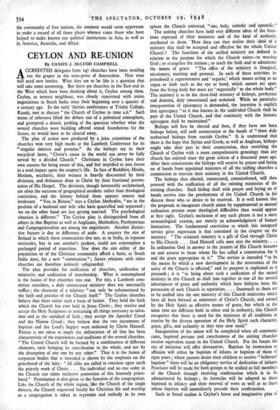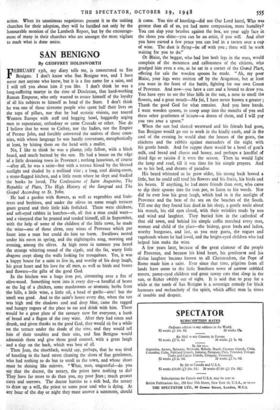CEYLON AND RE-UNION
By CANON J. McLEOD CAMPBELL
A CCREDITED delegates from rc churches have been treading out the grapes in the wine-press of Amsterdam. New wine will need new bottles. What they are to be like is a question that will take some answering. But there are churches in the East and in the West which have been thinking about it, Ceylon among them. Ceylon, as nearest neighbour, was closely concerned with union negotiations in South India since their beginning over a quarter of a century ago. In the early 'thirties conferences at Trinity College, Kandy, met to discuss "the Church of Ceylon in woo A.D." Such terms of reference lifted the debate out of a polemical atmosphere, and prompted a drastic probing of the question whether what the several churches were building offered sound foundations for the future, or would have to be cleared away.
The plan of action now produced by a joint committee of the churches won very high marks at the Lambeth Conference for its "singular interest and promise." As the bishops say in their encyclical letter, "Christ's cause in the world can never be fully served by a divided Church." Christians in Ceylon have their own reasons for being aware of this, and feel impelled to join forces in a total impact upon the country's life. In face of Buddhist, Hindu, Moslem, secularist, their witness is heavily discounted by their divisions, and dishonour done to Christ by their fractional presen- tation of His Gospel. The divisions, though lamentably acclimatised, are often the outcome of•geographical accident rather than theological conviction, and the history behind them appears remote and irrelevant. "You in Britain," says a Ceylon Methodist, "are in the position of a husband and wife who have quarrelled and separated ; we on the other hand are just getting married. The psychological situation is different." The Ceylon plan is distinguished from all others in that Baptists as well as Anglicans, Methodists, Presbyterians and Congregationalists are among the negotiators. Another distinc- tive feature is due to difference of scale. A country the size of• Ireland in which these communities live not, as in India, in separate territories, but in one another's pockets, could not contemplate a prolonged period of transition. Nor does the size either of the population or of the Christian community afford a basis, as South India does, for a new " communion" ; future relations with other churches are therefore jealously safeguarded. - The plan provides for unification of churches, unification of ministries and unification of membership. What is contemplated is the fusion of five churches into one. For this, a Lambeth com- mittee considers, a duly consecrated ministry does not necessarily suffice ; the character of a ministry "can only be substantiated by the faith and practice of the Church itself." The Ceylon churches believe that there exists such a basis of fusion. They hold the faith which the Church has ever held in Jesus Christ ; they receive and accept the Holy Scriptures as containing all things necessary to salva- tion and as the standard of faith ; they accept the Apostles' Creed and the Nicene Creed ; they believe that the two sacraments of baptism and the Lord's Supper were ordained by Christ Himself. Fusion is not taken to imply the obliteration of all that has been characteristic of the experiences and traditions of the several churches. "The United Church will be formed by a combination of different elements, each bringing its contribution to the whole, and not by the absorption of any one by any other." That it is the fusion of corporate bodies that is intended is shown by the emphasis on the priesthood of the laity: "All alike are called to continue upon earth the priestly work of Christ. . . . No individual and no one order in the Church can claim exclusive possession of this heavenly priest- hood." Prominence is also given to the function of the congregation. Like the Church of the whole region, like the Church of the single diocese, the Church organised locally for Christian life and worship as a congregation is taken to represent and embody in its own
sphere the Church universal, "one, holy, catholic and apostolic,"
The uniting churches have held very different ideas of the func- tions expected of their ministers and of the kind of authority attributed to them. How then can they realise their ideal of a ministry that shall be accepted and effective for the whole United Church ? The functions of the unified ministry are defined in relation to the purpose for which the Church exists—to worship God ; to evangelise the nations ; to teach the faith and to administer the means of grace. "The office of the ministry is liturgical, missionary, teaching and pastoral. In each of these activities its priesthood is representative and 'organic,' which means acting as an organ or limb such as the eye or hand, which cannot act apart from the living body but must act ' organically ' to the whole body." The ministry is to be the three-fold ministry of bishops, presbyters and deacons, duly consecrated and ordained. While no particular interpretation of episcopacy is demanded, the intention is explicit that episcopacy "as it was known in the undivided Church shall be part of the United Church, and that continuity with the historic episcopate shall be maintained."
Bishops will first be elected and then, if they have not been bishops before, will seek consecration at the hands of "three duly authorised bishops from outside Ceylon." It is understood that there is the hope that Syrian and Greek, as well as Anglican, bishops might take their part in their consecration, thus enriching the Church of Ceylon with a more comprehensive genealogy than any church has enjoyed since the great schism of a thousand years ago. After their consecration the bishops will receive by prayer and laying on of hands from appointed ministers of all the uniting churches a commission to exercise their ministry in the United Church.
The bishops thus elected, consecrated, commissioned, will then proceed with the unification of all the existing ministries of the existing churches. Each bishop shall with prayer and laying on of hands receive into the presbyterate of the United Church in his diocese those who so desire to be received. It is well known that the proposals to inaugurate church union by supplemental or mutual ordination present more theological difficulties than would appear at first sight. Ceylon's exclusion of any such phrase is not a mere terminological evasion, nor merely an acknowledgment of human limitations. The fundamental conviction to which this inaugural service gives expression is that contained in the chapter on the ministry. "The ordained ministry is a gift of God through Christ to His Church. . . . God Himself calls men into the ministry..
In ordination God in answer to the prayers of His Church bestows on and assures to those whom He has called a commission for it and the grace appropriate to it." The service is intended "to be the means by which a new development in the restoration of the unity of the Church is effected," and its purpose is explained as it proceeds ; it is "to bring about such a unification of the sacred ministry in this Church as shall join together in one all the several inheritances of grace and authority which have hitherto been the possession of each Church in separation. . . . Inasmuch as there are to be unified into the one ministry of this Church ministries which have all been blessed as ministries of Christ's Church, and owned by the Holy Spirit as effective means of grace, but which at the same time are different both in ethos and in authority, this Church recognises that there is need for the ministers of all traditions to receive by the diverse operation of the Holy Spirit such character, grace, gifts, and authority as they may now need."
Inauguration of the union will be completed when all communi- cants, baptised persons and catechumens of the uniting churches receive equivalent status in the United Church. For the future the rite of initiation will offer alternatives. Baptism by .immersion or affusion will either be baptism of infants or baptism of those of riper years ; where parents desire their children to receive "believers' baptism" there will be an obligatory service of dedication of infants. Provision will be made for both groups to be unified as full members of the Church through receiving confirmation which is to be administered by bishops ; its formulas will be adapted to those baptised in infancy and their renewal of vows as well as to those whose baptism will immediately precede their confirmation.
Such in broad outline is Ceylon's brave and imaginative plan of action. When its unanimous negotiators present it to the uniting churches for their adoption, they will be fortified not only by the honourable mention of the Lambeth Report, but by the encourage- ment of many in their churches who are amongst the most vigilant to mark what is done amiss.



































 Previous page
Previous page